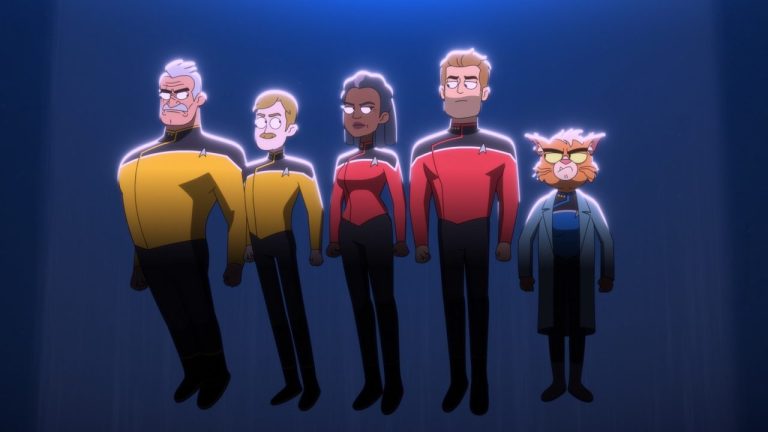Star Trek: Lower Decks Episode 8 Review: Veritas
Star Trek: Lower Decks makes a strong statement about the Trek franchise: Maybe the best episodes are courtroom dramas?

This Star Trek: Lower Decks review contains spoilers.
One of the reasons Star Trek is is so resilient is that it has the ability to dip into a variety of genres. From whodunnit mystery to gothic romance to several straight-up westerns, Trek is much more than a simple space opera. But, the one genre we sometimes forget that Star Trek freaking loves is the courtroom drama. In the latest episode of Star Trek: Lower Decks, the crew of the USS Cerritos reminds us that for whatever reason, sometimes the best way to explore the Final Frontier is inside of something that looks like a courtroom. Is the crew really on trial? Is Lower Decks secretly putting the entire Star Trek franchise on trial? The answer to both of these questions is no and yes, but you could easily reverse those answers and still be right.
I want to call “Veritas” the best episode of Lower Decks yet, and that’s because it’s easily the one that made me laugh the most. My critic brain won’t let me say that though, because I actually think last week’s episode was the best one, because it was 100 percent focused on the characters, specifically Mariner, and why she is the way she is. In short, I like Lower Decks when it’s doing its meta-Trekkie jokes, but mostly doing that to say something interesting about one of the main characters.
“Veritas” isn’t like that. Mariner, Tendi, Rutherford, and Boimler don’t grow or change in this episode, nor do any of them have huge epiphanies about life, the universe, or anything. Instead, the point of this episode is to remind the Lower Deckers, and us, that very often, the machinations of why things happen in the Federation are borderline nuts. We don’t really know why this secret mission happened, and we’re never gonna know. But, along the way, we’re reminded that some of the most memorable Star Trek episodes of all time, take place in a formal setting in which people are testifying, basically, on behalf of Star Trek’s core values.
In “Veritas,” the Lower Deckers are being asked to tell their truth about a mission that involved the rescue of an alien named Klarr. The platform the testify from is basically a direct copy of the Klingon trial in The Undiscovered Country. Boimler references “The Drumhead” toward the end, by pointing out the trial is unfair. Q (John de Lancie) appears in this episode, in his dystopian judge’s robes, recalling his first appearance in “Encounter at Farpoint,” where he — you know — put all of humanity on trial. Everything about this episode is saying, yep, we’re gonna make fun of the fact that a lot of great Trek episodes are trials, and, if you take Q’s statements seriously, in the first and last episodes of The Next Generation, that show was one big trial. Or as Q said to Picard, “You just don’t get it. The trial never ends.”
Lower Decks does firmly get it. This is why, the joke at the end of the episode reveals that nobody was ever on trial, to begin with, and the whole thing just seemed that way because the customs of this planet are different than what we’re used to. Sometimes what looks like a trial, is actually a celebration. This joke works, but it’s certainly not the best joke in the entire episode, mostly because the episode is so damn funny it’s hard to pick just one moment. Rutherford attends a Gorn wedding briefly but then passes out. That kind of qualifies as the perfect inside baseball Star Trek joke.
The last-minute joke that a trial was never really taking place isn’t bad, but it does sort of rob the episode of some of its Trek meta-commentary. Q is by no means the main character in this episode, but instead, seems to exist as a kind of synecdoche for the idea of what the episode is about: From “The Measure of a Man” to “The Menagerie,” great Treks often happen because everybody has to testify as to why Starfleet is so great. In this episode, the Lower Deckers do the same thing, albeit a little more on-the-nose than some of those episodes I mentioned, but not much more on the nose. In this way, “Veritas,” has one truth it’s here to remind us of: Sometimes the best Star Trek isn’t remotely subtle. Sometimes it’s somebody standing in front of a judge and saying, nope, we’re good people, and here’s why. Lower Decks doesn’t have to say that this approach to storytelling is cool or slick. It’s just here to say that it works.
